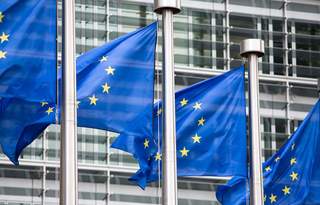
Europe is to become climate-neutral, more digital and more resilient. © Fotolia/Vander Wolf
Half-time for the European Commission
Autumn is the time for strategic planning in the Brussels political arena. This year the European Commission likewise made a start with its strategic foresight report. This report defines fields of action that are crucial for strengthening Europe's open strategic autonomy in the future - including ensuring a low-carbon and affordable energy supply, promoting digital technologies, stable health systems, a secure supply of raw materials and access to space.
In September, Commission President Ursula von der Leyen delivered her annual State of the Union. Noticeably proud, the President looked back on progress in vaccinations against the COVID-19 virus, economic reconstruction and climate protection. She also prepared the parliamentarians for the challenges of the coming year: Europe is to become climate-neutral, more digital and more resilient.
Work Programme 2022 of the European Commission
The work programme of the European Commission for 2022, which Vice-President Maroš Šefčovič presented to the European Parliament in Strasbourg in mid-October after intensive consultation with the Parliament and the Council, was the final item on the agenda. It contains all the important initiatives that the Commission intends to launch in 2022. In addition, the Commission lists in it which open legislative procedures are to be completed as a matter of priority, which legislative proposals are to be withdrawn and which existing legal acts are to be revised.
Two years after Ursula von der Leyen took office, the work programme heralds the second half of her term, which runs until the European elections in 2024. Commission proposals that are not launched early next year have little chance of being passed by the European legislature in this legislative period. This is because the average duration of an ordinary legislative procedure in Brussels is about one and a half years.
42 new EU legislative initiatives announced
For 2022, the European Commission is planning significantly fewer new proposals than in 2021. While the Commission had more than 80 new initiatives in its programme for the current year, it intends to present 42 new political and legislative texts next year. Exceptions prove the rule: in some particularly industry-relevant regulatory areas, such as EU environmental policy, important Commission proposals - including for a sustainable product policy - are pending. Overall, however, the focus is on the 76 legislative initiatives already submitted, which the Commission, Council and Parliament want to advance as a matter of priority in the next twelve months - above all the various climate policy measures to implement the European Green Deal.
BDI again expects important Commission initiatives with industrial relevance for next year. The Brussels authority wants to better protect the environment through several legislative packages. Among other things, a legislative proposal on plastics is intended to reduce the use of microplastics in products and their release into the environment. In the area of digitalisation, the Commission is planning a European chip law to respond to the current supply bottlenecks for semiconductors. Numerous industrial sectors - above all the automotive industry - are currently considerably affected by this. In future, Europe is to become more independent and innovative in semiconductors. Furthermore, common standards for the cyber security of products are to be defined in a law on cyber defence.
In addition, the European Commission wants to promote fair taxation by presenting proposals for the implementation of the global OECD agreements on the redistribution of taxation rights and a worldwide minimum taxation. Finally, Europe's role in the world is to be strengthened, among other things, by amending the so-called Blocking Regulation. The aim is to prevent third countries from imposing extraterritorial sanctions more effectively. In the past, Europe lacked convincing instruments to prevent, for example, the United States from sanctioning European companies that maintained business relations with persons or countries that the US had imposed sanctions on.
Apply "one-in-one-out" principle
Now it is up to the European Commission's services to translate the announcements of the Commission's leadership into policy papers and legislative proposals. The stakeholders of German industry in Brussels are in for another exciting few months. In all proposals, industry will press for the Commission to keep its promise to compensate for new burdens by reducing existing ones (the so-called "one-in-one-out" principle).



